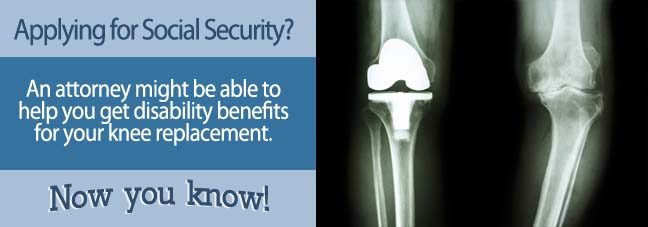Applying for Social Security disability benefits can be stressful, lengthy, and difficult. After such a tricky process, it is understandable to be frustrated or disheartened when your first application is denied.
Fortunately, an initial claim denial does not have to mean the end of the road. In fact, around 65% of all disability applicants have their initial applications turned down. To continue fighting for benefits for your knee replacement, we must first figure out why your claim may have been denied.
Potential Causes for a Knee Replacement Denial
Of all the disorders listed in the Social Security Administration’s Blue Book, knee replacements are one of the most notoriously difficult to get approval for. This does not mean that your knee replacement does not qualify for benefits, though — the difficulty getting approval can be for multiple reasons, such as:

- Length of disability. One of the only requirements of all disabilities across the board is that they last a) longer than 12 months, or b) are expected to result in death. Unless your knee replacement was warranted by another larger, more severe medical issue, then it’s likely that SSA reviewers will be judging your case against the “longer than 12 months” rule. If they believe that your condition has or will be resolved enough in the year since your knee replacement, then they may not award you benefits.
- Ability to ambulate effectively. In Sections 1.02 and 1.03 of the Blue Book (which address joint problems and replacements), it states that applicants must show an inability to “ambulate effectively” (walking, standing/sitting, using extremities, etc.) in order to qualify. If the SSA does not believe that your knee replacement hinders you enough to qualify as severely disabling (perhaps because you can still care or yourself, work part-time, or not rely on assistive devices), then they may hesitate to award you disability benefits.
After assessing your case to see why you may have been denied, it is time to schedule and prepare materials for your in-person case hearing.
Preparing for Your Hearing
Disability hearings are held in front of an administrative law judge (ALJ) in order to assess your condition and qualifications in person. Because hearing waiting lists can grow rather long, it is important to schedule your hearing as soon as possible. This can be done by calling your local Office of Disability Adjudication and Review (ODAR) or making an appointment in-person.
When preparing for your hearing, it is always best to bring more than you think you need. The more evidence you have supporting your case, the more likely you are to receive benefits. Evidence may include:
- new test results (knee MRIs/CT scans, mobility tests, RFC forms, etc.) to compare to those sent in with your initial application
- hospitalization records, medication lists, assistive devices, and financial records
- written testimonies from physicians, therapists, old bosses/coworkers, or loved ones attesting to the severity of your disability
- scheduled in-person testimonials (from anyone listed above)
Benefits of a Disability Attorney
Especially when preparing for a disability hearing, there are few resources more beneficial than a disability attorney. An attorney can familiarize themselves with your case and build a strong legal argument that could make all the difference in you receiving benefits. To further cut risk, federal law prevents disability attorneys from taking payment up front — attorneys may only take payment if their services help you to win your case.
Before your disability hearing, consider a free consultation with a disability attorney to see if their legal expertise may be right for you.